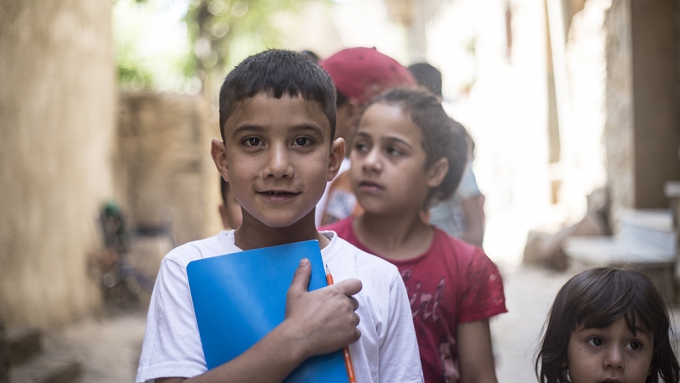Education
 Education is a central part of Save the Children’s work in Lebanon. Our goal is to increase access to quality, inclusive and safe education for the most vulnerable girls and boys. Save the Children believes that education is a fundamental human right and key in helping children to achieve their full potential and invests in addressing barriers to education, providing opportunities for the most vulnerable children, including children with disabilities. Given the high number of out of school children in Lebanon, strengthening access to and retention in education remains a key priority. This includes Early Childhood Care and Development (ECCD) classes, which are vital to prepare children for enrolment in basic education, and other Non-Formal Education opportunities such as Basic Literacy and Numeracy courses. To help improve retention rates in formal education, Save the Children also provides remedial support for children who are at risk of drop out. We ensure that our education programming has strong links with other sectors, including Child Protection, Livelihoods and WASH, and promote gender equality throughout our programming. In addition, we work to integrate socio-emotional learning components to enhance the wellbeing of children.
Education is a central part of Save the Children’s work in Lebanon. Our goal is to increase access to quality, inclusive and safe education for the most vulnerable girls and boys. Save the Children believes that education is a fundamental human right and key in helping children to achieve their full potential and invests in addressing barriers to education, providing opportunities for the most vulnerable children, including children with disabilities. Given the high number of out of school children in Lebanon, strengthening access to and retention in education remains a key priority. This includes Early Childhood Care and Development (ECCD) classes, which are vital to prepare children for enrolment in basic education, and other Non-Formal Education opportunities such as Basic Literacy and Numeracy courses. To help improve retention rates in formal education, Save the Children also provides remedial support for children who are at risk of drop out. We ensure that our education programming has strong links with other sectors, including Child Protection, Livelihoods and WASH, and promote gender equality throughout our programming. In addition, we work to integrate socio-emotional learning components to enhance the wellbeing of children.
Save the Children works in line with the Reaching All Children with Education II (RACE II) Strategy and the Lebanon Crisis Response Plan (LCRP). Building on its local and global expertise, Save the Children works closely with the Ministry of Education and Higher Education (MEHE) and key education actors in Lebanon and is an active member of the Lebanon Humanitarian INGO Forum (LHIF). Aligned with our partnership strategy, we aim to work through a local education partner, where possible, helping to strengthen local capacities and ensuring the sustainability of its interventions.
In 2019, Save the Children reached 14,745 children (50% boys, 50% girls) through non-formal education programs in 35 centres across Lebanon. Particular emphasis was put on engaging parents and the community in children’s education, as well as on building the capacity of local partners on quality teaching approaches and increasing the integration of child protection and education, e.g. through on the ground support from caseworkers and enhanced referral mechanisms.
In response to the COVID-19 crisis, Save the Children has established a remote education approach to ensure that children’s learning and wellbeing is supported during the crisis. The approach aims to enhance children’s core competencies and skills, using online modalities (mainly WhatsApp) and providing tailored support to caregivers and children. The approach includes three main components: 1) enhancing children’s learning outcomes, 2) improving the social and emotional wellbeing of children, and creating protective environments at home, and 3) raising awareness on COVID19 for caregivers and children to be able to protect themselves (complementing other initiatives).
 Lebanon
Lebanon